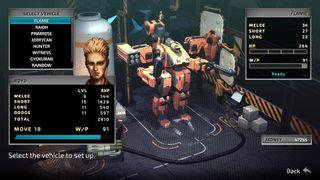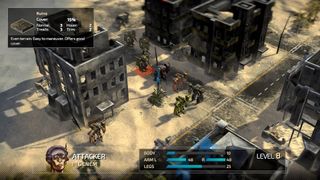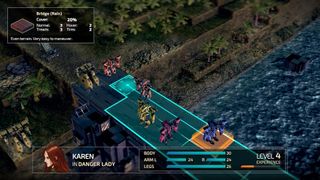Front Mission 1st: Remake is an appetizer for better mech strategy RPGs to come
The mech classic gets a tune-up, but no spinning rims.

Front Mission 1st: Remake posed me an awkward question when it released on PC June 30, and I’d like to answer it from my mech cockpit. The strategy genre on PC has its own hall of fame nowadays, with modern titans like XCOM 2 and BattleTech and Japanese legends like Tactics Ogre: Reborn. And there are so, so many fresh indie strategy games to play in between. So: is there even a reason for a remake of an obscure Super Nintendo game, even with fresh paint over all the bullet holes?
Originally Front Mission was exclusive to Japan—with no official translations into English, even when it was ported to the PlayStation in 2003—so the series, especially this first game, isn’t well known. The lifespan of the Front Mission games outside of Japan is actually incredibly narrow, with the first English-language game, Front Mission 3, releasing in 2000 and the last coming in 2004 with Front Mission 4 (not counting a later actiony spin-off). With just a paltry five years to appreciate the series' war-is-hell world of giant robots, it’s a real dark horse next to other tactics RPGs like Final Fantasy Tactics or Fire Emblem.
But Front Mission has something those games don't: Mechs.
I love strategy RPGs and mechs of all kinds, and after discovering Front Mission 3, I devoured the fan translation of the first Front Mission by the light of an ancient laptop with a dying hard drive. Ever since then the rest of the Front Mission series has been one of my white whales, long stalked and greatly desired. Front Mission 1st: Remake is a welcome attempt to jump the batteries of a series that's been sitting in the scrapyard for way too long, but it just barely holds up as a strategy game 28 years later.
This remake doesn’t mess around much with the formula of the original game. Other than being translated, the story hasn’t been altered, and the core gameplay mechanics are unchanged. There’s a wide spectrum of gaming remakes, and if one end is Square Enix's Final Fantasy 7 Remake, where ‘inspired by’ feels like a more accurate tag, then the other end is Front Mission 1st: Remake. Quality of life improvements like mouse control, free camera, and a tactical map are all excellent, and Front Mission would feel awkward without them next to contemporary games, but this is otherwise essentially the same game I played decades ago.
I was regularly annoyed with some minor oversights in the upgrade. One example: mech weapons aren’t displayed on their model on the map screen, making identifying threats, or even your own setups, difficult at a glance. While I eventually started color-coding the paint jobs on my mechs based on what I’d equipped them with, it would have been a nice quality of life change.

Each time I upgraded my mechs, I’d have a pile of parts and weaponry left over clogging up my inventory. Since upgrades are so regular—I found myself overhauling nearly my entire team about every two missions—clearing out all the backstock made me more of a bored clerk than a mercenary mech pilot.
The biggest gaming news, reviews and hardware deals
Keep up to date with the most important stories and the best deals, as picked by the PC Gamer team.
The choice to change from sprites to more modern 3D is nothing special, but I did like the use of focus and blur post-processing effects to make battlefields and mechs appear to be miniatures. I’d have loved to see more of this effect pushing a stronger sense of art direction, but it’s kind of just a light touch you notice from time to time.
Royd and the rest of the characters of this first game don’t express much personality, but the Front Mission series calling cards are here: big politics between mega-nations and commentary on war and the military industrial complex. 1st: Remake isn’t a thriller, but it’s involved enough to make me want to chat with bar patrons in each city and feel a prickle of tension over who or what is going to betray my team next.
I did run into a strange bout of unintentional bug-based storytelling in my playthrough: at the beginning of the story, Royd loses a member of his team named Karen, who he is ostensibly in love with. Throughout the game, he’s uncertain if she is dead or simply missing, and thoughts and rumors about her haunt him constantly. Then in an inconsequential battle over a bridge, I found that for some reason Karen’s name and mech dossier from the start of the game would show up for me while moving around onto certain empty squares.

It was pretty spooky to me, and while I’m sure it’s just a bug, part of me wanted it to be a bit of clever atmospheric storytelling. Karen haunting Royd like some sort of ghost-in-the-machine parable is going to have to remain my own personal head canon.
More than any minor bugs, story ghosts, or UI annoyances, the remake is defined by its adherence to Front Mission's combat. I really enjoyed blasting my way through the fair portion of the game I’ve made it through so far, but I think mostly it’s made me long to play its more complex descendants. The mechanics of 1st: Remake feel too simple next to what followed, and I was regularly bored with the lack of distinction between weapon types, the very basic pilot skills, and the majority of weapons being, essentially, different shades of melee.
While Front Mission 1st: Remake does stand on its own legs, the strict adherence to its source has it wobbling around like the first generations of DARPA robots. It just looks a bit quaint and amateur after decades of strategy RPG (and mech game) advancement. I'm already looking past 1st: Remake to what comes after it. I’m hopeful for what the team at Forever Entertainment SA will do with the remakes of the following games in the series, especially Front Mission 3—my personal favorite—and I hope that their faithful adaptation skills will shine with the more refined games in the series.
And until then, there are some incredible BattleTech mods out there demanding to be played.

Sarah is a contributor for PC Gamer, formerly of TechRadar Gaming. With five years of experience writing freelance for several publications, she's covered every genre imaginable and probably a few she made up. She has a passion for diversity and the way different genres can be sandboxes for creativity and emergent storytelling, and loves worldbuilding. With thousands of hours in League of Legends, Overwatch, Minecraft, and countless survival, strategy, roguelike, and RPG entries, she still finds time for offline hobbies like tabletop RPGs, wargaming, miniatures painting, and hockey.
Most Popular

